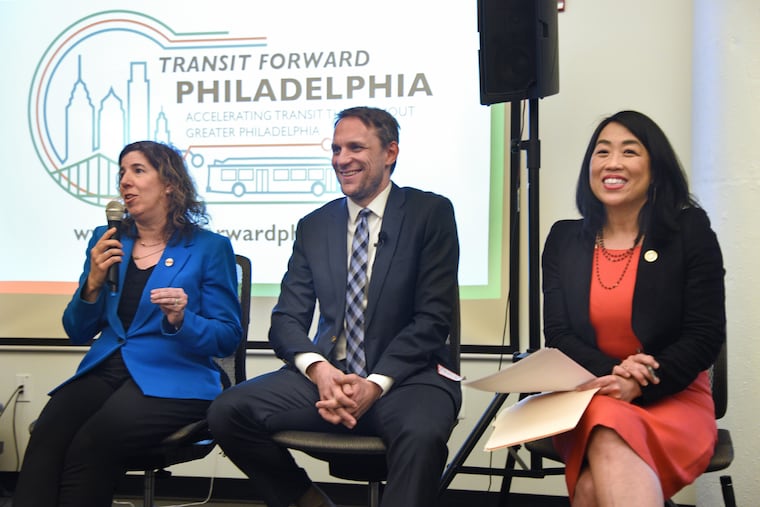As SEPTA readies fare proposal, GM Leslie Richards asks riders for opinions
"Tell us what you don’t like about it, and I have a feeling there will be things you won’t like about it," SEPTA GM Leslie Richards said. "But we need to hear from you.”

As SEPTA prepares to release its latest fare proposal, General Manager Leslie S. Richards is assigning “homework” to riders.
During Thursday evening’s public launch event for Transit Forward Philadelphia, an advocacy coalition, Richards said SEPTA would announce its “fare restructuring proposal” next week. She called on the riders and advocates who packed the room to participate in the public hearing process ahead of a formal vote on a package in late May.
“This is your time to tell us what you like about it, and there will be things you like about it," she said. "Tell us what you don’t like about it, and I have a feeling there will be things you won’t like about it. But we need to hear from you.”
Richards disclosed plans during a panel discussion alongside City Councilmember Helen Gym and Chris Puchalsky, director of policy and strategic initiatives at the Office of Transportation, Infrastructure, and Sustainability. The panel was led by the coalition’s organizer, Yasha Zarrinkelk. The event was at Azavea, a software company at 990 Spring Garden St.
The details come a week after Richards heard from advocates — and City Councilmember Jamie Gauthier, who was also at Thursday’s launch — during SEPTA’s monthly board meeting, calling for an end to transfer fees.
SEPTA said it would share its proposal in March, with hearings to follow in late April. A hearing examiner would then make recommendations for SEPTA’s board to consider in May. Changes, if approved, would take effect July 1. SEPTA last saw a fare increase in 2017 and has a schedule of increasing costs every three years.
The transfer fees bring in at least $14 million annually, about 3% of passenger revenue. Both Gym and Puchalsky echoed support of the transfer fee elimination. The city’s Connect, or strategic transportation plan, too calls for an end to the fees.
“It forces riders to make decisions that are suboptimal, where they have to transfer, they have to pay more," Puchalsky said.
» READ MORE: For Philly’s poor commuters, SEPTA fare ranks among most expensive in U.S. cities
» READ MORE: SEPTA transfer fees are an outdated, burdensome penalty on Philadelphians | Opinion
Dena Driscoll, chair of 5th Square, an urbanist political action committee, who has for years advocated to eliminate transfer fees, was excited that Richards referred to the proposal as a “fare restructuring.”
“It felt different — even if it’s just like a phrase right now, we don’t know what that looks like,” she said, following the panel.
The discussion, lasting over an hour, covered topics including SEPTA’s bus network redesign, frequency, transportation equity, and finances. The threat of losing a major source of funding through the Pennsylvania Turnpike Commission in 2022 has sent officials looking for solutions.
“While the state is looking at different modes of dedicated funding sources, the city can as well," Gym said. Congestion pricing could be another option. Puchalsky’s suggestion of a fee on Uber and Lyft was met with applause.
Transit Forward Philadelphia is a welcomed addition for the city and SEPTA. The city has highlighted a need for “more civic engagement organizations in transportation, particularly around transit," like Transportation Choices Coalition in Seattle and Transit Choices in Baltimore.
The coalition is led by 10 member-organizations, including 5th Square, the Bicycle Coalition of Greater Philadelphia, and the Clean Air Council.
Other organizations that have joined the coalition’s efforts include AARP Pennsylvania, Conservation Voters of Pennsylvania, PenTrans, the Philadelphia Association of Community Development Corporations, Service Employees International Union 32BJ, the Sierra Club and Philadelphia Climate Works, and the Sustainable Business Network of Greater Philadelphia.
The coalition calls for fairer fares and upgrades to the bus network, amid falling ridership, as some of its top priorities. Mostly, though, it aims to elevate representation of those it believes have been left from the table, like low-income riders and communities of color.
“Transit Forward Philadelphia wants to make sure that those voices," Zarrinkelk said, “like we’ve said a million times, are heard.”